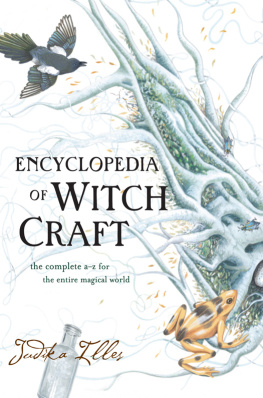Judika Illes - The Element Encyclopedia of 5000 Spells
Here you can read online Judika Illes - The Element Encyclopedia of 5000 Spells full text of the book (entire story) in english for free. Download pdf and epub, get meaning, cover and reviews about this ebook. year: 2004, publisher: Element Books, genre: Religion. Description of the work, (preface) as well as reviews are available. Best literature library LitArk.com created for fans of good reading and offers a wide selection of genres:
Romance novel
Science fiction
Adventure
Detective
Science
History
Home and family
Prose
Art
Politics
Computer
Non-fiction
Religion
Business
Children
Humor
Choose a favorite category and find really read worthwhile books. Enjoy immersion in the world of imagination, feel the emotions of the characters or learn something new for yourself, make an fascinating discovery.
- Book:The Element Encyclopedia of 5000 Spells
- Author:
- Publisher:Element Books
- Genre:
- Year:2004
- Rating:3 / 5
- Favourites:Add to favourites
- Your mark:
- 60
- 1
- 2
- 3
- 4
- 5
The Element Encyclopedia of 5000 Spells: summary, description and annotation
We offer to read an annotation, description, summary or preface (depends on what the author of the book "The Element Encyclopedia of 5000 Spells" wrote himself). If you haven't found the necessary information about the book — write in the comments, we will try to find it.
The Element Encyclopedia of 5000 Spells — read online for free the complete book (whole text) full work
Below is the text of the book, divided by pages. System saving the place of the last page read, allows you to conveniently read the book "The Element Encyclopedia of 5000 Spells" online for free, without having to search again every time where you left off. Put a bookmark, and you can go to the page where you finished reading at any time.
Font size:
Interval:
Bookmark:
For Herta and Zoltan Illes, and Rachel and Jordan Nagengast, without whose love, patience, and support, this book could never have been written.
The Element Encyclopedia of 1000 Spells contains an overview of magical spells and practices from a multitude of eras, traditions, and places. It is intended as an inclusive encyclopedia and reference book. Many of the spells contained within these pages are not to be used and should not be reproduced. Some involve dangerous, potentially harmful, and deadly poisonous botanicals. The author and the publisher strongly advise against using any spells containing noxious substances or poisonous botanicals, or spells containing blood (the use of which could result in the transmission of blood-borne diseases which may be fatal). These spells are only reproduced here to provide a historical context.
Any reader uses the spells entirely at their own risk and the author and publisher accept no liability if the spells do not have the desired effect or if adverse affects are caused.
THIS BOOK IS NOT SUITABLE FOR CHILDREN.
The image is so familiar as to qualify as an archetype. It appears in countless movies, television shows, and theatrical productions. If youre of a literary bent, youll find it in countless novels, too. Although there may be variations on the theme, the core image remains consistent: someone, usually but not always a witch or wizard, faced with a serious dilemma, reaches for a massive book of magic spells.
The contents of this book are rarely displayed. (An exception occurs on the television series, Sabrina the Teenage Witch. As befitting a twenty-first-century witch, Sabrinas edition is interactive.) Oversized, well-worn, and clearly used, this book is obviously no coffee-table book but a familiar companionin every sense of the word familiar. Sabrinas book makes almost as many appearances as her black cat, and consistently proves more reliable.
The books very presence transmits subliminal messages. If there were previously any doubts regarding someones identity, then the act of reaching for the book, mere possession of this book in fact, is usually sufficient to establish occult credentials. Consider depictions of Merlin or Morgan le Fay: their big books of spells are as much a part and parcel of their magical trappings as any animal familiar, crystal ball, or wizards robes. Millions of kitschy statues feature an elderly gray-bearded man clutching a massive book. He may or may not be wearing his peaked wizards hat but his identity is clear. How do we know hes a wizard? By the book that he holds.
This book thus signals that its reader is a metaphysician or is striving to be one. If the reader handles the book with comfort and ease, the implication is that he or she is a person of power. The book, however, can also compensate for the readers very lack of experience and knowledge. One frequent variation on the theme depicts a complete novice discovering sophisticated magical solutions within the books pages. Typically the novice is in way over his head in disaster. The very appearance of the book signals that salvation is at hand: the secrets of salvation are contained within the books pages, if only the novice will follow its directions. (Conversely, Mickey Mouses inability to use such a book for anything other than a flotation device in The Sorcerers Apprentice only underscores his magical ineptitude and general incompetence.)
This spell book thus possesses transformative powers. It can transform anyone (well, Mickey excepted) into a magical adept. Its aged, well-worn appearance also indicates that this book is timeless: it never outlives its usefulness.
This archetypal book is based on both fact and fantasy.
Collections of spells rank among Earths earliest written documents. Not only are magical texts among the oldest surviving pieces of literature, but many scholars and anthropologists suggest that it was the need to record spells and divination results that stimulated the very birth of writing. Magic, as we will see, is the true mother of invention. In ancient Egypt, the lunar god Thoth is credited as the inventor of both magic and writing. He is the patron of scribes and magicians. It was rumored that in addition to inventing the systems of spelling and writing, Thoth created the very first book, authoring no less than a sacred revelation of Earths most powerful secret spells and rituals. The legendary Book of Thoth was believed to hold the key to all the secrets of the universe. To possess a copy of the book enabled one to command and control destiny itself.
The ancient Egyptians loved stories featuring books of power. Several of their legends remain to us, including the original version of Walt Disneys The Sorcerers Apprentice. Egypt, at the time, was a theocracy: religion and government were one. The reigning pharaoh was simultaneously the child of the god, the living embodiment of the god, and the gods foremost high priest, and vast temple complexes, financed by the state, contained literary annexes known as Houses of Life.
These combination scriptoria/emergency clinics housed wizard priests, on the government payroll. For a fee, these professional magicians would consult their extensive library of magic texts to provide their clientele with enchanted solutions to lifes many dilemmas. Perhaps, legend had it, the Book of Thoth was hidden in the depths of one of these magic libraries. Perhaps it was stashed in some priest or pharaohs tomb. Or perhaps it was eventually deemed so dangerous that, too powerful to destroy, the book had been locked into a chained, weighted iron box and thrown into the depths of the sea.
Access to occult knowledge bestowed power and prestige. The magical texts were hoarded and kept secret. Many were written in code, to prevent profane eyes from understanding what was read.
A few centuries before the dawning of the Common Era, the independent Egyptian nation was defeated, first by the Persians, then by the Greeks and Romans. Indigenous Egyptian religion and political structure degenerated. The Houses of Life were abandoned; the lucrative, respected profession of government-employed wizard-priest no longer existed. It was the last time in history that working with magic was a secure, respectable profession.
Although the profession ceased to exist, the big spell books survived, at least in fragments. Its difficult for modern readers, so accustomed to printed, standardized texts, to recall that until the invention of the printing press, every book was hand-written and frequently unbound. Copies of copies of copies were made, each perhaps slightly different than the next. In the chaos that ensued as Egypt was successively conquered, individual pages were either smuggled out of the now unguarded temple libraries as personal treasures or auctioned off, page-by-page, papyrus-by-papyrus for personal profit. When Alexandrias famed library, which boasted a copy of every book then in existence (the city stole them from arriving ships), was burned to the ground, the value of the few surviving manuscripts increased.
With the rise of Christianity, magic, together with its texts and professionals, was vilified. Spell books were burned en masse. Yet some were saved, if not whole books, then individual pages and pieces. We know this to be true, because some still remain, their spells reproduced in many books including this one, preserved at great personal risk throughout the ages, during eras when possession of magical texts warranted the death penalty.
These treasured pages survived, secretly passed between adepts and initiates, as did legends of mysterious books of power just waiting to be recovered. The Book of Thoth is one but there were others:
Font size:
Interval:
Bookmark:
Similar books «The Element Encyclopedia of 5000 Spells»
Look at similar books to The Element Encyclopedia of 5000 Spells. We have selected literature similar in name and meaning in the hope of providing readers with more options to find new, interesting, not yet read works.
Discussion, reviews of the book The Element Encyclopedia of 5000 Spells and just readers' own opinions. Leave your comments, write what you think about the work, its meaning or the main characters. Specify what exactly you liked and what you didn't like, and why you think so.

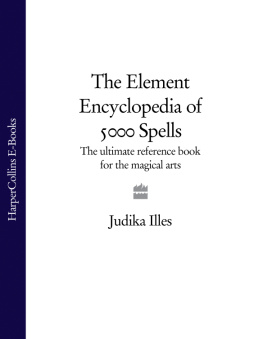
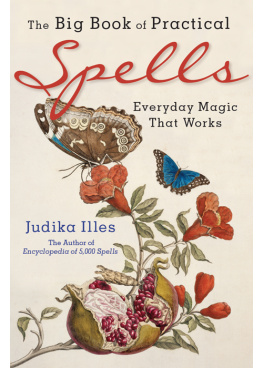
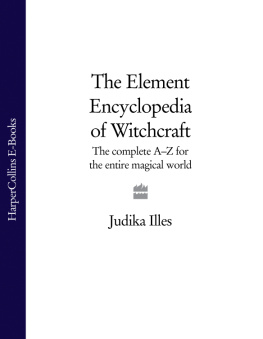
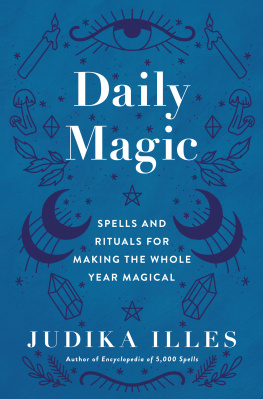

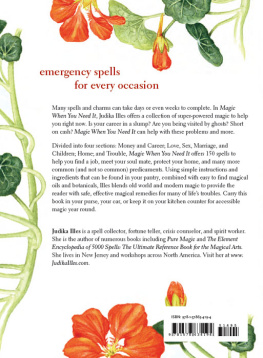

![Illes - The element encylopedia of 5000 spells: [the ultimate reference book for the magical arts]](/uploads/posts/book/203560/thumbs/illes-the-element-encylopedia-of-5000-spells.jpg)
